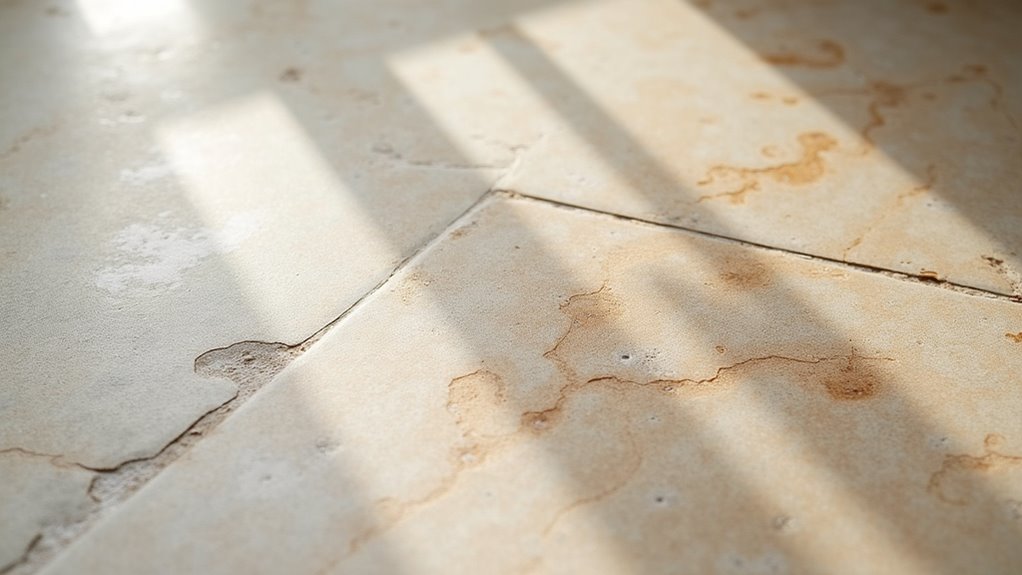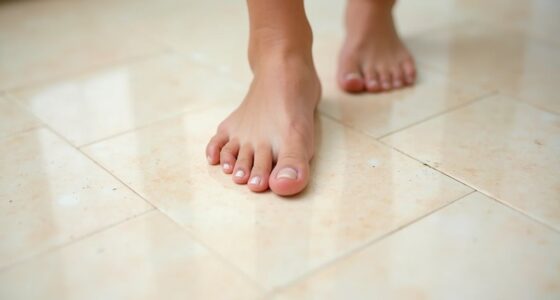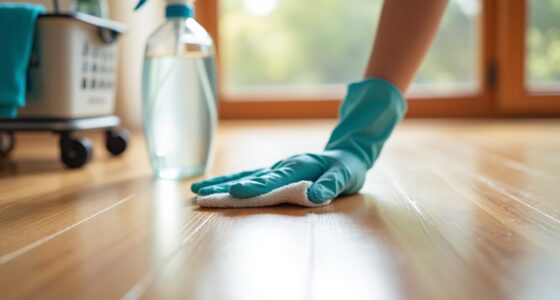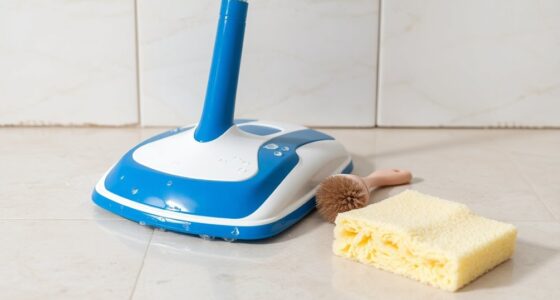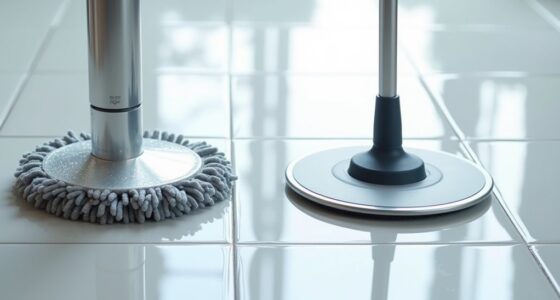Using harsh or abrasive scrubbers on natural stone can cause scratches, dull spots, and irreversible damage. Avoid stiff-bristled brushes, abrasive pads, or aggressive cleaning chemicals, as they strip away the stone’s natural luster. Instead, opt for gentle tools like soft cloths or sponges and proper cleaners designed for natural stone. Understanding your stone’s properties and avoiding over-scrubbing make a big difference—if you keep exploring, you’ll discover safer cleaning tips for long-lasting beauty.
Key Takeaways
- Using stiff or abrasive scrub brushes can scratch and dull natural stone surfaces.
- Over-scrubbing with harsh chemicals strips the stone’s natural finish and causes damage.
- Relying on rough pads or abrasive tools accelerates surface wear and introduces scratches.
- Applying excessive force during cleaning can create dull spots and surface imperfections.
- Choosing gentle, non-abrasive cleaning tools and proper products prevents costly polishing errors.
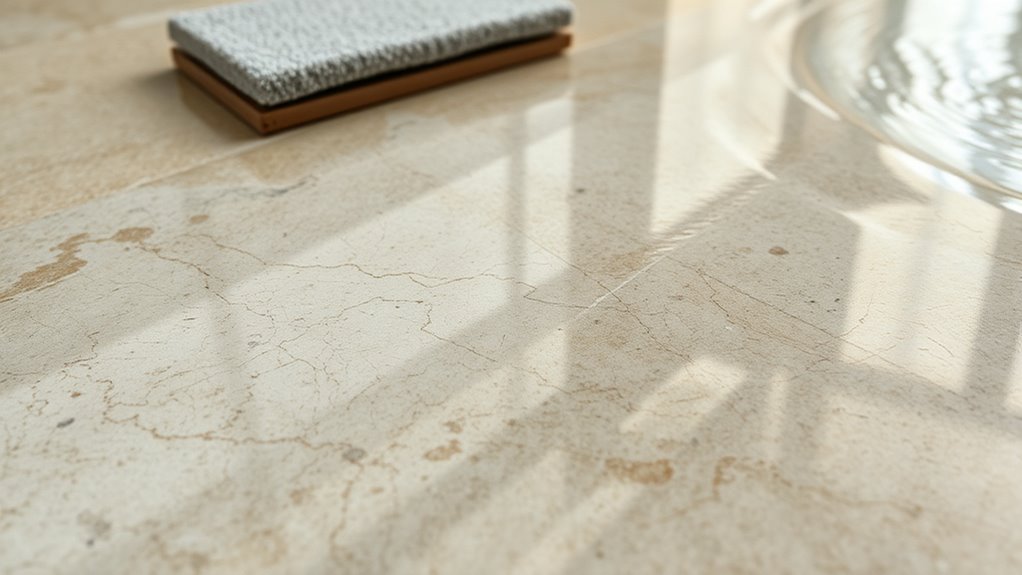
Natural stone surfaces require careful cleaning to maintain their beauty and durability, but many people make common mistakes when using scrubbers that can cause damage. One of the most frequent issues is polishing errors, which happen when harsh or inappropriate cleaning techniques leave behind dull spots or scratches. These mistakes often stem from improper cleaning methods, such as using rough scrubbers or abrasive cleaners that strip away the stone’s natural luster. When you scrub too aggressively or use the wrong tools, you risk dulling the surface and creating unsightly marks that are difficult to restore. It’s essential to recognize that natural stone is sensitive, and over-scrubbing or using aggressive chemicals can accelerate wear and tear.
Many people underestimate the importance of selecting the right cleaning tools. Using a stiff-bristled scrub brush or abrasive pads seems like a quick fix for stubborn stains, but it’s actually a common cause of polishing errors. These tools can scratch the stone surface, leaving behind tiny abrasions that catch dirt and grime, making the surface look dull over time. Instead, opt for soft cloths or sponges designed specifically for natural stone. Gentle cleaning tools prevent unnecessary damage and help preserve the stone’s natural sheen. Proper cleaning isn’t just about scrubbing harder; it’s about being precise and gentle, respecting the stone’s delicate surface. Additionally, understanding the properties of natural stone can guide you in choosing the appropriate cleaning methods and products to avoid damage.
Frequently Asked Questions
Can Using a Scrubber Damage the Sealant on Natural Stone?
Yes, using a scrubber improperly can damage the sealant on natural stone. If the scrubber isn’t compatible with your sealant, it may cause scratches or wear that compromise its protective layer. To preserve the sealant, choose a scrubber designed for natural stone and avoid harsh abrasives. Regularly check your sealant’s condition and reapply when needed, ensuring your stone stays protected and beautiful.
Are There Specific Scrubber Types Best for Different Stone Surfaces?
Yes, choosing the right scrubber depends on your stone surface. For delicate natural stones, use gentle manual scrubbers to avoid damage. Electric scrubbers work well for tougher stains on more durable surfaces but should have soft brushes to prevent scratching. Always select scrubbers designed for natural stone, and test a small area first. Using the appropriate type guarantees you clean effectively without harming your stone’s sealant or finish.
How Often Should I Deep Clean My Natural Stone With a Scrubber?
You should deep clean your natural stone with a scrubber every 4 to 6 months, following general frequency guidelines. Regularly updating your cleaning schedule helps prevent buildup of dirt and grime that can damage the surface. Use gentle, pH-neutral cleaners and avoid harsh abrasives. By sticking to this routine, you’ll maintain your stone’s beauty and longevity, ensuring it stays in excellent condition over time.
Is It Safe to Use Commercial Scrubbers on All Natural Stones?
You shouldn’t use commercial scrubbers on all natural stones. They can scratch, etch, or damage delicate surfaces. Instead, opt for gentle cleaning agents and proper stone polishing techniques that respect each stone’s unique properties. Always check manufacturer guidelines before cleaning, and test in a small area first. By choosing suitable cleaning agents and avoiding harsh scrubbers, you preserve your stone’s beauty and longevity.
What Signs Indicate My Natural Stone Has Been Damaged by Scrubbing?
You’ll notice signs like pitting and etching, which appear as dull spots or surface damage, indicating harsh scrubbing. Discoloration and haze can also develop, making the stone look cloudy or uneven. If the surface feels rough or shows irregularities, it’s a sign that scrubbing has compromised the finish. These issues mean the natural stone’s protective layer has been damaged, and it may need professional restoration to restore its original beauty.
Conclusion
Avoiding common scrubber mistakes can extend the beauty and lifespan of your natural stone. Did you know that improper cleaning can reduce its lifespan by up to 30%? By using the right techniques and easy fixes, you’ll preserve your stone’s elegance and avoid costly repairs. Remember, gentle cleaning and proper tools make all the difference. Keep these tips in mind, and your stone will stay stunning for years to come.
